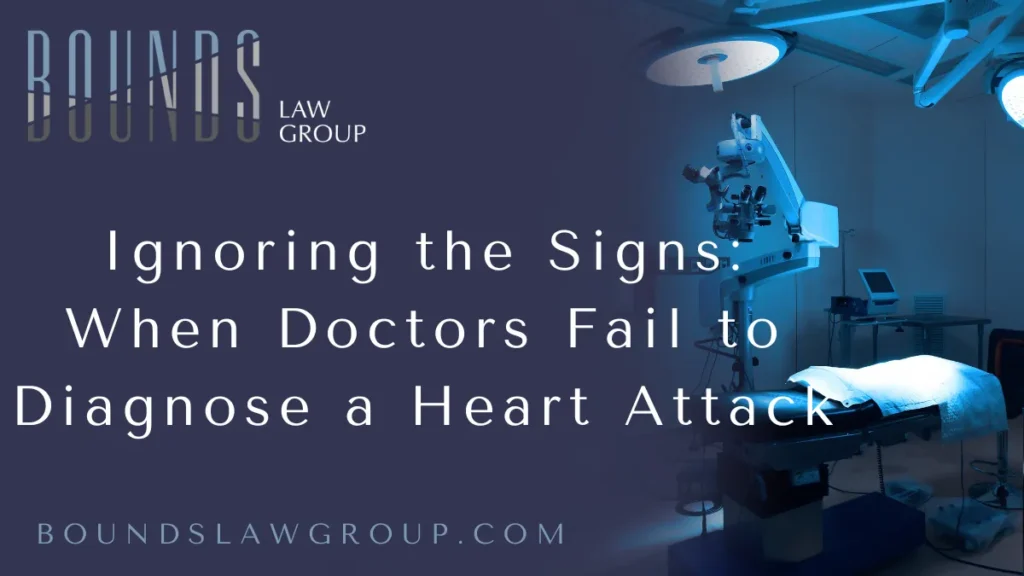
Failure to Diagnose a Heart Attack | Bounds Law Group
Heart attacks remain one of the leading causes of death in the United States, yet heart attack misdiagnosis continues to be a tragic, and often preventable, failure within our healthcare system. When a physician fails to recognize the signs of a heart attack, the results can be catastrophic—leading to serious injury, permanent disability, or even death. At Bounds Law Group, we stand with victims of medical negligence and fight to hold healthcare providers accountable when their errors cause irreparable harm.
Complete our free case evaluation form or call us now at 877-644-5122 to get the justice and compensation you deserve.
What is Heart Attack Misdiagnosis?
A heart attack misdiagnosis occurs when a healthcare provider fails to correctly identify or treat a myocardial infarction. These life-threatening medical events demand swift and accurate intervention. However, in too many cases, patients reporting chest pain, nausea, fatigue, or shortness of breath are sent home with diagnoses such as indigestion, anxiety, or muscle strain.
This misdiagnosis can stem from a variety of reasons:
- Failure to perform diagnostic tests such as EKGs, cardiac enzyme tests, or stress tests.
- Misreading test results or attributing abnormal findings to less serious conditions.
- Gender bias, particularly among female patients, who may present with different or atypical symptoms.
- Age bias, where younger individuals are assumed to be at lower risk for cardiac events.
The consequences of this negligence are devastating. Every minute that passes without proper treatment increases the damage to heart tissue and decreases the patient’s chance of survival.

Common Symptoms Often Overlooked in Heart Attack Misdiagnosis
Heart attacks do not always present with dramatic chest-clutching pain. In fact, symptoms can vary greatly depending on the individual’s sex, age, or underlying health conditions. Doctors who fail to recognize the following warning signs are putting lives at risk:
Chest Discomfort
Pressure, squeezing, or a sense of fullness.
Shortness of Breath
Especially when accompanied by chest discomfort.
Nausea or Vomiting
Pain in Arms, Jaw, Neck, Back, or Stomach
Cold Sweat, Lightheadedness, or Sudden Fatigue
When a doctor dismisses these symptoms or fails to conduct proper testing, the delay in diagnosis can be fatal.
Who Is at Risk of Heart Attack Misdiagnosis?
While anyone can be misdiagnosed, certain populations face increased risk:
Women
Often present with non-classical symptoms, such as back or jaw pain, nausea, or shortness of breath, which may be overlooked by male-centric diagnostic criteria.
Young Adults
May not be considered at risk due to their age, leading to underdiagnosis.
Rural Patients
In facilities with limited diagnostic equipment or overburdened emergency departments.
Minority Communities
Who may receive disparate levels of care due to systemic healthcare inequalities.
These biases and oversights are inexcusable and legally actionable when they result in injury or death.
The Legal Grounds for Filing a Heart Attack Misdiagnosis Lawsuit
When a doctor, nurse, or medical facility fails to follow the standard of care expected in diagnosing a heart attack, it may constitute medical malpractice. Victims or their families may pursue compensation if it can be shown that:
- A doctor-patient relationship existed;
- The medical provider breached the duty of care by failing to properly diagnose or treat the condition;
- That breach caused injury or death; and
- The victim suffered damages, including medical costs, pain, loss of income, or wrongful death.
At Bounds Law Group, our experienced medical malpractice attorneys meticulously investigate every detail of your case. We consult with medical experts, review hospital records, and build compelling legal strategies to pursue maximum compensation on your behalf.
How Bounds Law Group Holds Negligent Doctors Accountable
Bounds Law Group has a long-standing reputation for aggressively representing victims of heart attack misdiagnosis across the region. Our attorneys understand the science behind cardiac events and the legal framework required to prove negligence.
We do not shy away from tough cases. Our team:
- Secures expert testimony from cardiologists and emergency medicine professionals;
- Analyzes timelines of diagnosis, testing, and treatment;
- Examines hospital protocols and deviations from best practices;
- Builds airtight arguments designed to stand up in court or settlement negotiations.
We fight not only for compensation—but for justice, systemic change, and prevention of future tragedies.
Real Life Impact: Stories from the Misdiagnosed
Consider the case of a 49-year-old woman who visited the emergency room complaining of chest pressure and shortness of breath. Despite clear symptoms, she was discharged with a diagnosis of acid reflux. Hours later, she collapsed at home and died from a heart attack. Her death could have been prevented with a simple EKG and cardiac enzyme test.
Or the case of a 34-year-old man told he was having a panic attack. No tests were run. Two days later, he suffered a massive cardiac event, resulting in permanent heart damage.
These are not isolated incidents. They are tragically common.
Compensation Available for Victims and Families
Victims of heart attack misdiagnosis may be entitled to significant compensation, including:
- Medical expenses, including ongoing care and rehabilitation
- Lost income and loss of earning capacity
- Pain and suffering
- Emotional distress
- Loss of consortium for family members
- Wrongful death damages, including funeral expenses and the loss of companionship
At Bounds Law Group, we pursue every available avenue to recover the full value of your claim.

Preventing Heart Attack Misdiagnosis: Steps Patients Can Take
While medical professionals hold the responsibility for diagnosing and treating heart attacks, patients can play an essential role in advocating for their own health and reducing the risk of heart attack misdiagnosis. Being proactive about one's health can help ensure that any potential heart issues are taken seriously and appropriately treated. Here are several steps patients can take to help prevent a misdiagnosis:
Know Your Risk Factors
Understanding your risk for a heart attack is crucial in guiding discussions with your healthcare provider. Common risk factors include:
- Age: The risk increases with age, especially after 45 for men and 55 for women.
- Family history: A family history of heart disease can significantly increase your chances of experiencing a heart attack.
- High blood pressure and high cholesterol: These conditions can cause damage to the heart and blood vessels over time.
- Diabetes: Diabetes increases the risk of heart attack by affecting blood sugar levels and damaging blood vessels.
- Smoking and obesity: Both smoking and carrying excess weight contribute to the buildup of plaque in arteries, raising the risk of heart disease.
When visiting a doctor, make sure to discuss these risk factors, as they can help shape your doctor’s diagnostic approach.
Speak Up and Be Specific About Symptoms
Patients should be as clear and specific as possible about the symptoms they are experiencing. If you are feeling any chest discomfort, shortness of breath, dizziness, or fatigue, explain the intensity, frequency, and duration of these symptoms. Don’t be afraid to express your concerns, especially if you feel that your symptoms are being dismissed as minor.
For example, rather than simply saying “I feel chest pain,” explain it as “I feel a pressure-like sensation in my chest that comes and goes” or “I’ve been feeling unusually fatigued and out of breath during normal activities.” The more detailed you are, the better your doctor can assess your situation.
Request Diagnostic Tests
If your doctor is not immediately offering diagnostic tests such as an EKG, blood tests, or chest X-rays, don’t hesitate to ask for them. Diagnostic tests provide crucial information that can help confirm whether you’re experiencing a heart attack or another condition.
For individuals with higher risk factors, it’s important to request these tests proactively, even if you believe your symptoms may not be serious. Early detection is key in preventing long-term damage.
Seek a Second Opinion if Necessary
If you feel that your concerns are not being fully addressed, or if you are unsure about the diagnosis you’ve received, seeking a second opinion can be a wise choice. Different healthcare providers may have varying levels of expertise or approaches to diagnosis, especially when dealing with complex conditions like heart attacks. Getting another perspective could potentially save your life.
Monitor Symptoms and Act Quickly
If you experience sudden, unexplained symptoms such as chest pain, nausea, or difficulty breathing, seek medical attention immediately. Heart attack misdiagnosis can happen when patients wait too long to seek care, or when healthcare providers assume less severe conditions. Do not wait for symptoms to worsen; the quicker you receive medical care, the higher your chances of surviving a heart attack.
By taking these proactive steps, patients can significantly reduce the likelihood of being misdiagnosed, and ensure they receive the proper treatment in a timely manner. While doctors hold the primary responsibility for diagnosing heart attacks, patients must also advocate for their own health to ensure their concerns are taken seriously and acted upon appropriately.
Take Action Now: Your Case Evaluation is Free
If you or a loved one has been harmed due to a heart attack misdiagnosis, do not wait. Statutes of limitation can prevent you from filing if you delay too long.
We encourage you to complete our free case evaluation form today and speak directly with our team. Or call us now at 877-644-5122 to schedule your free consultation.
Your health and justice cannot wait.
Sources
- American Heart Association - Heart Attack Symptoms
- A comprehensive resource explaining the signs, symptoms, and response actions for heart attacks.
- https://www.heart.org/en/health-topics/heart-attack/warning-signs-of-a-heart-attack
- National Institutes of Health - Diagnostic Errors in the Emergency Department
- A detailed report on how and why diagnostic errors occur, especially in acute settings like heart attacks.
- https://www.ncbi.nlm.nih.gov/pmc/articles/PMC4972806/
- Johns Hopkins Medicine - Medical Misdiagnosis Statistics
- A look into the prevalence of misdiagnosis and how it impacts patient outcomes, particularly in cases involving cardiac issues.
- https://www.hopkinsmedicine.org/news/newsroom/news-releases/study-suggests-medical-errors-now-third-leading-cause-of-death-in-the-us

